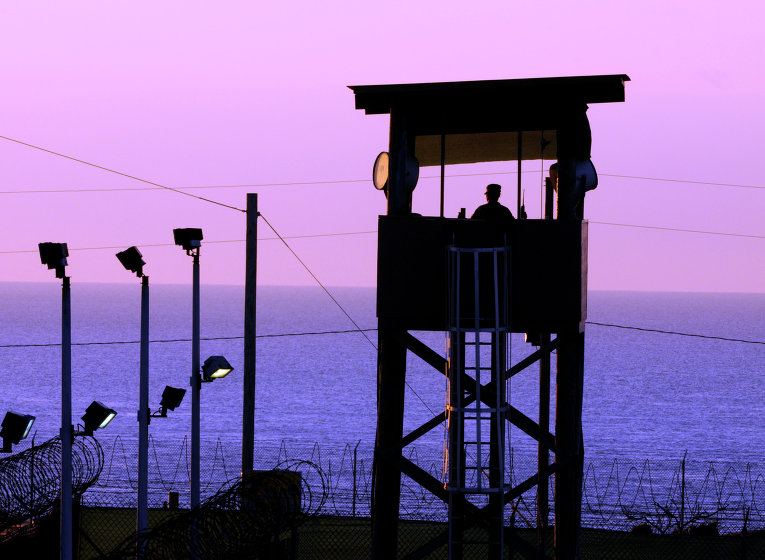MOSCOW, February 4 (RAPSI, Ingrid Burke) – The US Department of Defense (DOD) has moved for summary judgment in a case brought by a journalist seeking information on funds used for the construction and maintenance of a structure purportedly built in a secret location and used to hold high-value detainees within the Navy Base at Guantanamo Bay, according to court documents obtained by RAPSI.
The case was brought by Carol Rosenberg, a journalist acclaimed highly for her coverage of the detention center at Guantanamo Bay. Rosenberg works for The Miami Herald, which is known for its extensive coverage of Guantanamo.
According to a statement filed Friday by the DOD, Rosenberg requested in 2009 documents containing information on the money spent to build Camp 7, pursuant to the Freedom of Information Act (FOIA).
FOIA is a US federal law requiring government agencies to make certain types of information publicly accessible. Members of the public are able to file request forms with government departments and agencies, which in turn must either provide the information or prove that it cannot be released because it falls within the scope of one of nine valid exemptions to the law.
In a letter dated January 4, 2010, the DOD responded to Rosenberg’s request with the assertion that it had located one record responsive to her request, but that the department had determined that the release of the document in its entirety qualified under three FOIA exemptions: the first, second, and sixth.
The first of the nine FOIA exemptions applies to documents classified pursuant to an executive order. The second applies to information relating solely to internal personnel rules and practices of a given agency. The sixth applies to files that would constitute an unwarranted invasion of privacy if disclosed.
In its memo, filed Friday, the DOD asserted: “the one document responsive to Plaintiff’s FOIA request is classified in accordance with Executive Order 13,526, Section 1.4(c), as it pertains to intelligence activities, sources or methods, and therefore withheld the document in its entirety.”
On October 9, 2013 Rosenberg launched proceedings in a US federal court seeking to compel the DOD to provide limited information on the cost of Camp 7 to taxpayers.
According to the complaint: “Camp 7 is the facility built to house so-called ‘high value’ detainees moved to Guantanamo in 2006. DOD recently disclosed that the facility is structurally unsound and estimates it will cost $49 million to replace. Ms. Rosenberg also seeks to compel DOD to provide information about the continuing costs to taxpayers of operating Camp 7.”
In the complaint, Rosenberg asserted that she had initially sought the relevant information in 2009, and that the DOD had failed during the ensuing four years to conduct a reasonable search for the information, to disclose the documents she had requested, or to provide an adequate legal justification for withholding them.
The complaint makes note of the controversy surrounding the detention center: “The United States Government’s detention of hundreds of persons at Guantánamo as part of the Global War on Terror following the September 11, 2001 attacks has generated substantial controversy since the first detainees arrived in southeast Cuba in January 2002.”
The complaint further outlines the apparently unsuccessful presidential initiatives seeking the facility’s closure: “President Barack Obama has described the detention center as ‘expensive,’ ‘inefficient,’ and a ‘recruitment tool for terrorists.’ During the 2008 Presidential campaign he pledged to close it, and signed an executive order in January 2009 calling for the facility to be shuttered within a year. The deadline was missed, and the closure process has proven to be a slow one beset by political and practical challenges.”
Rosenberg asserts that an estimated 16 high-value detainees have been held since 2006 in Camp 7, which was constructed in secret within the territory of the Guantanamo Bay Naval Station, according to the complaint.
She argues that beyond an anticipated $49 million replacement cost, the DOD has not informed taxpayers of the funds required for its initial construction or upkeep.
In a memo accompanying its motion for summary judgment, the DOD asserted: “Indeed, the Department has conducted a thorough search for documents and has properly withheld the one responsive document based upon statutory exemptions to disclosure… Accordingly, the Court should grant summary judgment in favor of the Department.”
Notably, Friday’s memo relied on the first, fifth, and sixth FOIA exemptions, but not the second – which had been referenced in the 2010 letter. The fifth exemption applies to: “inter-agency or intra-agency memorandums or letters which would not be available by law to a party other than an agency in litigation with the agency.”
With regard to the fifth exemption, the memo notes that the document was prepared in order to guide the decision-making process of high-level policy makers at the agency – and that its disclosure would, “effectively chill the candid type of communication that occurred in the decision-making process here,” thus defeating the purpose of the fifth exemption.



